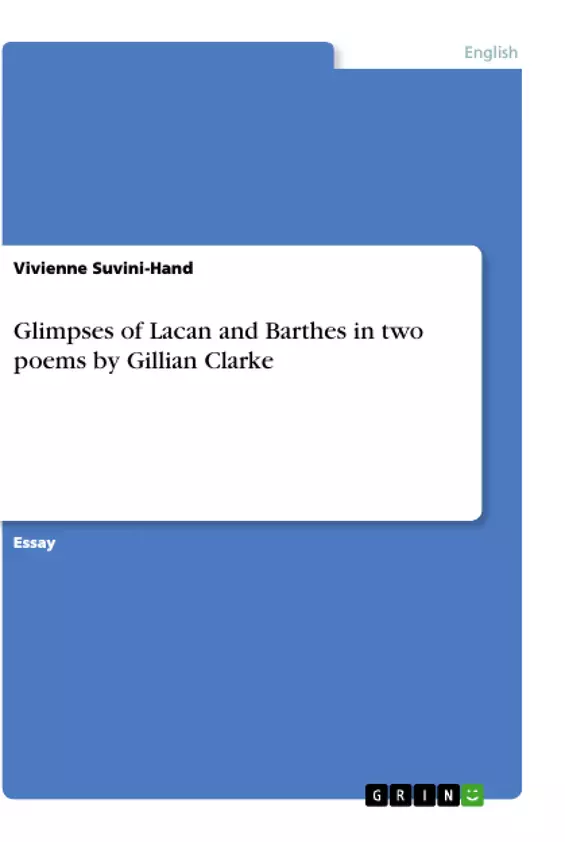Language is not a very predominant theme in the work of the Welsh poet and playwright, Gillian Clarke (born 1937) nor has she, to my knowledge, ever expressed an interest in linguistic theories and their application to literature. Her work tends to be rather autobiographical in style, recounting experiences involving her own family, children and local people. However, occasionally she touches upon the subject of education and of writing poetry (as for example in ‘Lunchtime lecture’ and ‘Pipistrelle’, respectively) and it is by way of these themes that issues concerning language come into play. Such is the case in ‘Clocks’ and ‘Miracle on Saint David’s Day’. In the first, I offer a Lacanian interpretation of the issue of ‘naming’ described in the poem. What the grandmother of the poem is concerned with is the development of the subject (her grandchild) and the need to construct his sense of ‘reality’ in and through language which in turn enables him to enter the Symbolic or Social Order. The official language of the Social Order is also pitted against what Lacan would term the ‘lalangue’ of the child, evident in his onomatopoeic utterances.
‘Miracle on St David’s Day’ is a testament to the miraculous power of poetry and I illustrate how Clarke is reinforcing that the oral articulation of poetical language can induce a sense of euphoria as described by Barthes in Le Plaisir du texte.
Inhaltsverzeichnis (Table of Contents)
- Language is not a very predominant theme in the work of the Welsh poet and playwright, Gillian Clarke (born 1937)
- ‘Clocks’ is a poem about learning, and it involves, like other poems by Clarke such as ‘Baby-sitting’ and ‘Catrin’, a mother-child relationship.
- The high-sounding phrase, ‘the power of naming’ has ironic overtones.
- As a means of further distinguishing between the child’s ‘lalangue’ and the official ‘La Langue’, ‘Clocks’ touches upon another feature of postmodernist theories of language much discussed by Lacan.
- The power of poetical language is also the focus of ‘Miracle on St David’s Day’.
Zielsetzung und Themenschwerpunkte (Objectives and Key Themes)
This text analyzes two poems by Gillian Clarke, "Clocks" and "Miracle on Saint David's Day," to explore how they demonstrate themes of language, learning, and the power of poetry. By drawing connections to the theories of Lacan and Barthes, the author examines the relationship between the child's "lalangue" and the official "La Langue," highlighting the importance of both in shaping our understanding of the world.
- The power of naming and language acquisition in childhood
- The contrast between official language and the child's "lalangue"
- The role of poetry in connecting with the "Real" and the subjective experience
- The importance of individual experience and the "miracle" of human connection
- The impact of language on identity and our understanding of the world
Zusammenfassung der Kapitel (Chapter Summaries)
- The first chapter introduces Gillian Clarke's work and its focus on domestic themes and the mother-child relationship. It establishes the context for the analysis of "Clocks" and "Miracle on Saint David's Day" by highlighting how these poems touch upon issues concerning language and education.
- The second chapter analyzes "Clocks" through a Lacanian lens, exploring the child's experience of the "Real" and the grandmother's attempt to introduce him to the Symbolic Order through language. The chapter discusses the child's unique perspective on nature and the potential conflict between official language and the child's innate understanding of the world.
- The third chapter delves into further aspects of Lacan's theory of language, specifically the distinction between "lalangue" and "La Langue." The chapter analyzes how "Clocks" utilizes the concept of language as a system of differences, demonstrating the child's ability to see connections and meanings beyond the official language.
Schlüsselwörter (Keywords)
This text delves into the concepts of "lalangue" and "La Langue" as presented by Lacan, exploring how they relate to poetry and language acquisition in childhood. The analysis focuses on the work of Gillian Clarke, particularly her poems "Clocks" and "Miracle on Saint David's Day," to examine the power of language, individual experience, and the importance of poetry as a form of communication and expression.
- Citation du texte
- Professor Vivienne Suvini-Hand (Auteur), 2019, Glimpses of Lacan and Barthes in two poems by Gillian Clarke, Munich, GRIN Verlag, https://www.grin.com/document/502307



